大学英语专业语法课件3——限定词Determiner
2024届高考语法复习专项:限定词Determiner 课件
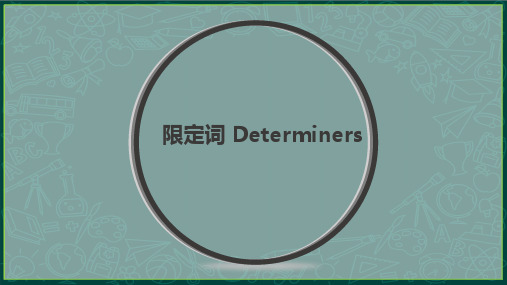
• We use a before a consonant sound and an before a vowel sound: • a banana, a university • an orange, an hour
二、限定词与名词的搭配关系
• We use the indefinite article, a/an, with singular nouns when
the listener/reader does not know exactly which one we are referring to: • Police are searching for a 14-year-old gril.
• I like bananas, oranges, apples - any fruit. = all kinds of fruit
• With a full licence you are allowed to drive any car. = all cars
e. We use another to talk about an additional person or thing. 我们用another来谈论另外的人或事。
an) (4)在bed, church, college, court, hospital, market, office, prison, sea,
school, table等名词前,如果带定冠词或不定冠词则表示该名词所 表示的处所;若不用冠词,则表示该处所的功能。 如: go to hospital去医院看;go to the hospital去医院(并不是去 看病,而是有其他目的) (5)类指的television和radio通常没有冠词,但是on/over/to the radio中,the不可省略,如listen to the radio, on the radio等;而 在television之前却又可以不用定冠词 watch(the)television, on(the)television.
大学英语语法之限定词ppt课件

2) One day they crossed the ____bridge behind the palace.
表示“形状”的词如:round square等。
“国籍”指一个国家或地区的词。
“材料”的词如:wooden, woolen, stone , silk等。
“作用类别”的词如:medical, college,writing desk,
police car等
9
典型例题: 1) Tony is going camping with ___ boys.
3 .( 2004 年辽宁卷 22 题) John Smith , a successful businessman , has a car .
A . large German white
B . large white German
C . white large German D . German large white
Such a beautiful girl. 2.As the old saying goes, there is no such thing as a
free lunch.
5
2.三类限定词的搭配关系
搭配关系:前位——中位——后位, 只含两类词时也适 用。
All the four teachers , all your three books , all these last few days , half his lecture , those last few months , such a misfortune …… The teacher asked his students to write their answers on every other line. Both my brothers have graduated from universities. The old men had a very good time during all these last few days.
英语语法---限定词

限定词(determiner)限定词的先后顺序: 前位---中位---后位(一个名词中心词之前不可并用两个前位限定词或两个中位限定词)冠词的表意功能(1)The ten of them have passed the final examination.Ten of them have passed the final examination.Ten of the (these/his) students have passed the final examination.(2)They asked to stop counting presidential votes for a second time.(3)Every boy and every girl___(have) his merits.Every young man, young lady,and child ___(be) requested to take part.Many a person___(be) going to the take the test.(4)Other or anotherCalifornia covers a large area than __________state except Alaska and Texas.Out of the three foreign guests, one is from Frankfurt, ______two are from Vienna.. Don'.los.heart.Hav.___try.There's room for _________people in the back of the bus.(5). ing.We'l.hav.____.five-da.holiday.(6)冠词的用法Who is ___captain of your team?. Mr.Reaga.wa.electe.___Presiden.o.th.Unite.State.i.1980.Charles Dickens,__author of David Copperfield, was a distinguished English novelist.As ____physician, he does not deserve much praise.He was covered with snow from ___head to __foot.The relation between ___teacher and ___student is excellent.This room serves the triple purpose of ___study, ___bedroom and ____sitting room. The old man was sitting in a chair, ___pipe in ___hand.He sat at ___ table, ___coat off, ___head down, and __pen in ___hand.What kind of ___man is he?What sort of ___book do you want?The work is ____pleasure to me.She has developed ___love for labour.Physics is ____ science.He spoke with _____ enthusiasm which inspired us all.Do you like ___ music of ___film?Phonetics is ____science of speech sounds。
大学英语专业语法课件3-限定词Determ
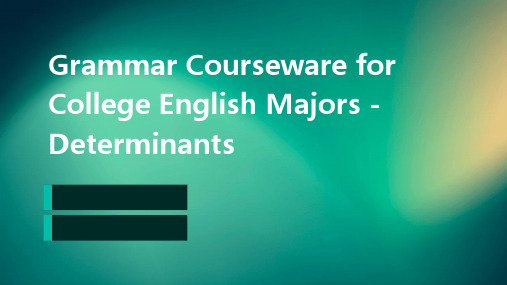
Types of determiners: There are different types of determiners, including articles, demonstratives ("this," "that," "these," "those"), quantifiers ("some," "any," "many," "few"), and possessives, each serving a specific function in relation to the noun.
Classification
Qualifiers can be divided into two main categories: adjectives and adverbs. Adjectives modify nouns or pronouns, adding descriptive details such as color, size, shape, age, etc. Adverbs modify verbs, adjectives, or other adverbs, adding details such as time, place, manner, degree, etc.
大学英语专业语法课件3——限定词Determiner
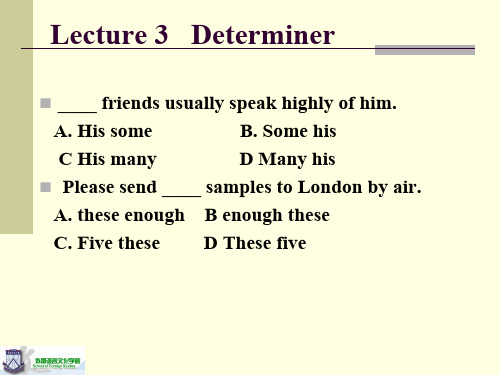
Independent Genitive
C) when the missing noun refers to church, school, or other public buildings, e.g.
Dickens’ / Dickens’s works, Jones’ / Jones’s poems, Marx’s Doctrine, Ross’s dissertation…
The meanings of Genitive Noun
Genissession, and therefore is called possessive case. But genitive meanings are by no means restricted to possession.
Lecture 3 Determiner
____ friends usually speak highly of him.
A. His some
B. Some his
C His many
D Many his
Please send ____ samples to London by air.
A. these enough B enough these
of-phrase, esp. in idiomatic expressions, e.g. children’s pictorial; a doctor’s degree; men’s clothing; at one’s wits’ end; at swords’ points; a hair’s breadth; a wolf in sheep’s clothing…
英语语法--限定词,冠词

2) 三类限定词的搭配关系 如果一个名词词组带有上述 三类限定词,其搭配关系总是按照“前位--中位- -后位”的顺序排列。 例如: all前the中four后teachers. all前your中three后books. all前these中last后few后days. 如果只有上述两类限定词, 其搭配关系仍按上述顺序。例如: half前his中lecture. those中last后few后months. several后hundred后guests. all 前other后students. such前a中misfortune. some中such后 alloy.
6〕能与单数名词和不可数名词搭配的限定词 有些限定词 如this, that, (the) least等能与单数名词和不可数名词搭配。 例如: (the) least sign (of prejudice), this / that job, (the) least knowledge, this / that work. 7〕能与复数名词和不可数名词搭配的限定词 还有些限定 词如a lot of, lots of, enough, more, most, such, other等可与复 数名词和不可数名词搭配。例如: a lot of books, a lot of money, lots of chickens, lots of food, plenty of chairs, plenty of water, enough copies, enough coal, more articles, more time, most people, most work, such men, such bread, other men, other bread. 不定量限定词less原先只与不可数名词搭配,但在现代英 语中,less既可与不可数名词也可与复数名词搭配。例如: less money, less mistakes.
英语语法课件之——3.限定词.ppt

in our room)
②Shut the door, please! ③How do you like the film? ④A: Do you need the car today, honey?
B: Yes. I have a lot of things to do. Why don’t I
Please open the windows.
④Books become more and more expensive. ∕ Put away the books on
your desk.
⑤Pencils contain lead (铅). ∕ Who put the pencils on the desk? ⑥Sugar isn’t very good for you. ∕ Can you pass me the sugar, please?
Much water is wasted. Much of water is wasted. Much of the water is wasted.
注:以上 这些“特指限定词”包括:this, that,
these, those; my, their, John’s等名词所有格;the
⑷其他数量词如a lot of, lots of, a couple of, plenty of, a number of, a great deal of一般直接 与名词连用。
①Clint is busy. He always has some work to do. But John is lazy. He never does any work.
determiner语法

限定词,也被称为determiner,是一种词类,对应的英文名称是determiner,在字典上常被缩写为det.或DET。
它的主要功能是用来限定后面的名词或名词短语,提供有关名词的一些信息,例如是否是特定的、离说话人近还是远的、单数还是复数等。
限定词包括以下几类:冠词、指示性形容词、疑问性形容词、物主性限定词、分配性限定词、量词、数字和前置限定词。
它们可以帮助我们确定名词的范围,例如“我的笔”中的“我的”就是限定词,用来指代所有权。
英语中有两种类型的冠词:定冠词"the"和不定冠词"a/an"。
"The"用于指代一个具体而独特的物品或个人,而"a/an"则用于指代任意一个。
此外,还有一些其他类型的限定词,如物主代词(如my, your, his, her, its, our, their)和指示代词(如this, that, these, those)等。
新编英语语法教程Determiners(课堂PPT)

9
❖ D. premodifiers ❖ adjectives
❖ determiners
❖
❖ function words
❖ content words
10
Definition
❖ Determiners: words that precede any premodifying adjectives in a noun phrase and which denote such referential meanings as specific reference, generic reference, definite quantity or indefinite quantity.
❖ 3. Last night I read a novel of Jane Austin’s.
❖ 4. That long report of Mr. Allen’s has been…
❖ 5. Those new shoes of yours…
❖ 6. I have read the article of the student who…
determiners
5
What’s the pattern of a noun phrase?
❖ (determiner +) (premodifier +) noun (+ postmodifier)
❖ all the college students ❖ his new book on phonology ❖ the author’s new novel ❖ three children’s book
❖ Bill pays no attention to the fact of…/ the fact that… ❖ What will the policy of the government is following
英语语法PPT之限定词Determiners

Ex. 6E
1. How much work have you done this morning? 2. To dig a tunnel will need a great amount of labor. 3. He’s done the least work. 4. There are several methods of approaching this problem. 5. I know little French. 6. There must be less empty talk but more practical work. 7. Were there many people at the perception? 8. May I have a few words with you? 9. There were fewer people today at the exhibition than yesterday. 10. Harry made the fewest mistakes. 11. You’ve learnt more poetry and done more exercises than I have.
Conversation is the most sociable of all human activities. And it is an activity only of humans. However intricate the ways in which animals communicate with each other, they do not indulge in anything that deserves the name of conversation.
Let’s warm up! GOOD MORNING!
第三单元 限定词,形容词、副词及比较等级稿

• 名词性定语(包括动名词)
• the first beautiful little white Chinese stone bridge • 那第一座漂亮的中式小白石桥
有些形容词的次序可以颠倒而意义不变, • 如 a thin dark face • 也可以说 a dark thin face 有时意义会改变 • 如 dirty American magazines • 弄脏了的美国杂志 • American dirty magazines • 美国的淫秽杂志
3) as + 形容词原级 + 名词词组 + as • Tom is as intelligent a student as Mike.
4) more …than
(比较级+than)
Tom is taller than his brother. Tom is more intelligent than his brother.
• • •
3)“定冠词+表示国籍的形容词”可泛指整个民族或 国人 the English
•
4)“定冠词+某些复数名词”可泛指一定的民族,阶 级或国人 the Chinese / the upper class / the intellectuals
3 其他用法
• 1)在表示某些独一无二的事物时,要用定冠词 • the sun ,the earth
•
• • • • •
both the twin brothers (前位 + 中位) all his three bothers (前 + 中 + 后) all other students (前 + 后) some such alloy (中 + 后) those last few months (中 + 后 + 后)
英语语法限定词
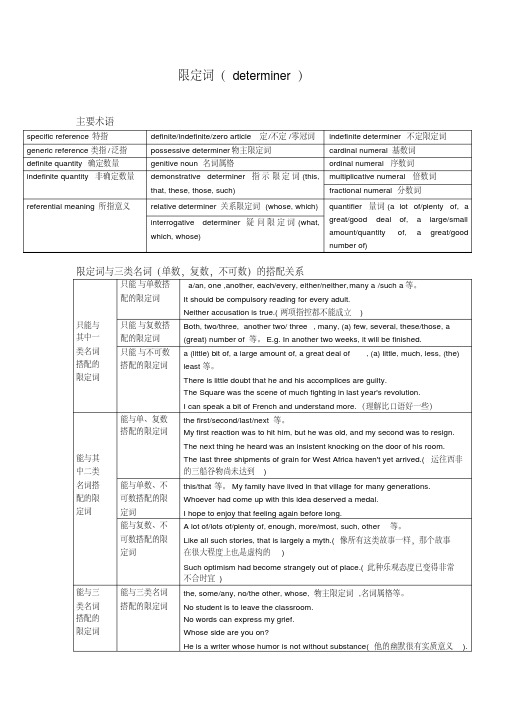
Electricity is a form of energy.
Unity is strength.
definite specific reference 确定特指(非常明确地指出何人
定冠词常有此种功能。 We own a dog and a cat. The dog is brown. And the
the/a/an/zero, this/that, these/those, some/any, no, every/each, either/neither, enough,
what(ever)/which(ever)/whose, 物主限定词,名词属格等。 基数词,序数词, next/last, other/another, many/much(a lot of, plenty of, a great
amount of.
Much information is now transmitted through e-mail.
There is much coal in the mine.
You can take as many copies as you need.
They can spend as much money as they need on the project.
限定词的先后顺序:前位 ---中位 ---后位 (一个名词中心词之前不可并用两个前位 限定词或两个中位限定词 )
前位限定词 predeterminer 中位限定词 central determiner 后位限定词 postdeterminer
Examples
all, half, both, double, 倍数词,分数词, what, such a/an 等。
专四语法第4节-限定词
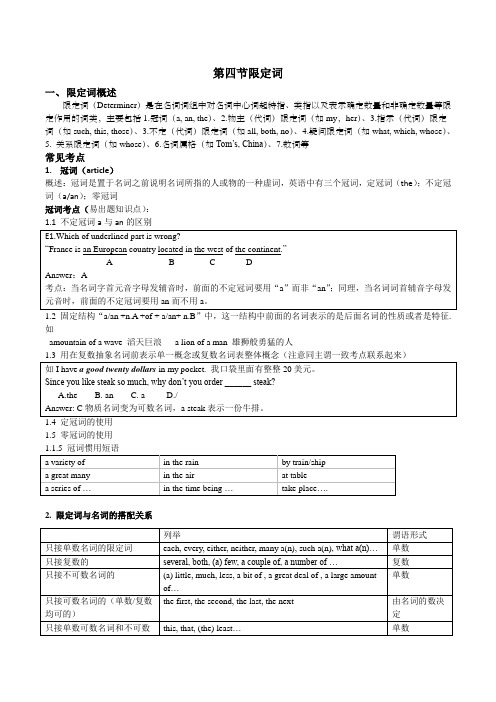
第四节限定词一、限定词概述限定词(Determiner)是在名词词组中对名词中心词起特指、类指以及表示确定数量和非确定数量等限定作用的词类,主要包括1.冠词(a, an, the)、2.物主(代词)限定词(如my,her)、3.指示(代词)限定词(如such, this, those)、3.不定(代词)限定词(如all, both, no)、4.疑问限定词(如what, which, whose)、5. 关系限定词(如whose)、6.名词属格(如Tom’s, China)、7.数词等常见考点1.冠词(article)概述:冠词是置于名词之前说明名词所指的人或物的一种虚词,英语中有三个冠词,定冠词(the);不定冠词(a/an);零冠词冠词考点(易出题知识点):1.1 不定冠词a与an的区别1.2 固定结构“a/an +n.A +of + a/an+ n.B”中,这一结构中前面的名词表示的是后面名词的性质或者是特征. 如amountain of a wave 滔天巨浪 a lion of a man 雄狮般勇猛的人1.3 用在复数抽象名词前表示单一概念或复数名词表整体概念(注意同主谓一致考点联系起来)如I have a good twenty dollars in my pocket. 我口袋里面有整整20美元。
Since you like steak so much, why don’t you order ______ steak?A.theB. anC. aD./Answer: C物质名词变为可数名词,a steak表示一份牛排。
1.4 定冠词的使用1.5 零冠词的使用2. 限定词与名词的搭配关系3.限定词与限定的之间的搭配关系3.2 多个限定词相遇时,其位置使用规则*基本规则:“前位+中位+后位”both the brothers all his two daughters (前+中+后)all other students (前+后) those last few minutes (中+后+后)*such做限定词有特殊规则:such+不定冠词(such位于前)当such 和其他的限定词(some, any, no, fall, few, another, other, many, one, two等)搭配时,such是后位限定词,如I’ve never seen such a dog.All such problems should be considered.4. 特殊限定词的使用4.1some 和any 的用法1)some, any与复数名词和不可数名词搭配,表“一些”some 和单数名词搭配表“某一”any与单数名词搭配表“任一”2)some一般用于肯定句中,也可以用在表示希望对方给出肯定回答的疑问句中any 多用语疑问,否定句,条件句,if/whether引导的从句3)固定搭配some day 来日some day or other 迟早not…any longer/more 不再at any rate/in any case 无论如何4.2no 的用法1)no可以修饰单数可数名词,复数名词和不可数名词,其意义相当于“not a “ “not any”, 所以no不能和a(n), any 连用。
2023届高考英语限定词复习课件

his last two books
the first two chapters
中后 后
中后 后
two more sheets
后后
若干限定词用法比较
个别限定词有跨类现象,如such既属于前位限定词, 又可归入后位限定词。由于它只是在such a ...和such an …这样的搭配中属于前位限定词,而在与其他限定 词(some,any,no,all,few,another,other, many,one,two等)搭配时,such则是后位限定词, 一律放在上述这些限定词的后面,如some such,any such,no such,few such,one such等,因此把它归 入后位限定词。
Many animals have diseases. Much information is now transmitted through E-mail. We have a great many questions to discuss at meeting. We are going to spend a large amount of money on children’s education.
Has he spent much money on the house? - Oh, a large amount.
many,much 可以带有how/too/so/as...as等修饰语。 I want to know how much money will be spent on the project. How many copies do you need for your class? I have (far) too many books on the shelf. We have had too much rain in the spring. It’s really surprising that the boy should have so much strength at his age. You can take as many copies as you need.
Grammar03_determiners
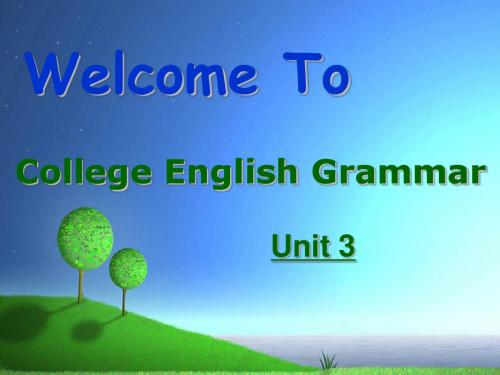
3. 4. 5.
Unit 3 Determiners
不定冠词的一些固定短语: 不定冠词的一些固定短语:
7. All of a sudden, I want to tell you about some things I do value and why. 突然之间,我想告诉你一些我确实重视的东西, 突然之间,我想告诉你一些我确实重视的东西,以及重 视它们的原因。 视它们的原因。 8. In a way, we had already taken the first step. 在某种意义上说,我们已经走了第一步。 在某种意义上说,我们已经走了第一步。 9. As a matter of fact, we must learn English through accumulating in drops. 实际上,我们必须通过一点一滴的积累来学会英语。 实际上,我们必须通过一点一滴的积累来学会英语。 10. Can you keep an eye on the baby while I go shopping? 你能否在我上街买东西的时候帮我看下这孩子? 你能否在我上街买东西的时候帮我看下这孩子? 11. Please lend a hand with my luggage. 请帮忙拿一下我的行李。 请帮忙拿一下我的行李。
Unit 3 Determiners
a little, a little of, a bit of
6. We should know a little of our history. 我们对过去的历史应有所了解。 我们对过去的历史应有所了解。 7. Elizabeth laid a little of her pay away each week. 伊丽莎白每周将工资储蓄一点。 8. Peter set his new novel aside for a year while he wrote some magazine articles to make a bit of money. 彼得将他的那部新小说搁置了一年,与此同时 与此同时,他给杂志撰 彼得将他的那部新小说搁置了一年 与此同时 他给杂志撰 钱用。 写一些稿件以便赚一点钱用。 9. Fire crews in California are getting a bit of help from the weather. 帮助。 天气为在加利福尼亚灭火的消防队员提供了一点帮助。 10. It takes a little bit of money to run a campaign. 竞选活动需要花一些钱.
English Grammar(Lecture 3 determiners)
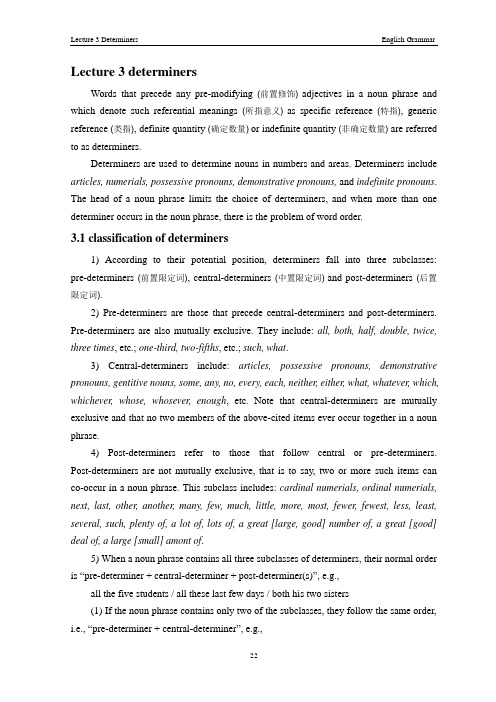
Lecture 3 determinersWords that precede any pre-modifying (前置修饰) adjectives in a noun phrase and which denote such referential meanings (所指意义) as specific reference (特指), generic reference (类指), definite quantity (确定数量) or indefinite quantity (非确定数量) are referred to as determiners.Determiners are used to determine nouns in numbers and areas. Determiners include articles, numerials, possessive pronouns, demonstrative pronouns, and indefinite pronouns. The head of a noun phrase limits the choice of derterminers, and when more than one determiner occurs in the noun phrase, there is the problem of word order.3.1 classification of determiners1) According to their potential position, determiners fall into three subclasses: pre-determiners (前置限定词), central-determiners (中置限定词) and post-determiners (后置限定词).2) Pre-determiners are those that precede central-determiners and post-determiners. Pre-determiners are also mutually exclusive. They include: all, both, half, double, twice, three times, etc.; one-third, two-fifths, etc.; such, what.3) Central-determiners include: articles, possessive pronouns, demonstrative pronouns, gentitive nouns, some, any, no, every, each, neither, either, what, whatever, which, whichever, whose, whosever, enough, etc. Note that central-determiners are mutually exclusive and that no two members of the above-cited items ever occur together in a noun phrase.4) Post-determiners refer to those that follow central or pre-determiners. Post-determiners are not mutually exclusive, that is to say, two or more such items can co-occur in a noun phrase. This subclass includes: cardinal numerials, ordinal numerials, next, last, other, another, many, few, much, little, more, most, fewer, fewest, less, least, several, such, plenty of, a lot of, lots of, a great [large, good] number of, a great [good] deal of, a large [small] amont of.5) When a noun phrase contains all three subclasses of determiners, their normal order is “pre-determiner + central-determiner + post-determiner(s)”, e.g.,all the five students / all these last few days / both his two sisters(1) If the noun phrase contains only two of the subclasses, they follow the same order,i.e., “pre-determiner + central-determiner”, e.g.,half his income / both my parents / all the teachers(2) “central-determiner + post-determiner”, e.g.,his last few words / the next two boys / every othe day(3) “pre-determiner + post-determiner”, e.g.,all three books / all other girls / half such people(4) “post-determiner + post-determiner”, e.g.,several hundreds of tourists / three other workers / many more copies6) When two post-determiners are used together, the order is usually fixed. If we change the order, we will get different meanings, e.g.,the last two pages (一本书的最后两页)the two last pages (两本书的最后一页)7) “Such” is very special. It can be used as pre-determiner and post-determiner, e.g.,such a lovely day / many such things3.2 collocations between determiners and nounsThe choice of determiners is closely related to what might be called the three classes of nouns: singular countable nouns, plural countable nouns and non-countable nouns. When we divide nouns into these three groups, we’ll get seven situations because these three classes of nouns demand appropriate determiners to collocate with.1. determiners with singular countable nouns onlyDeterminers such as, a(n), one, every, each, neither, another, many a, such a, can only collocate with singuar countable nouns, e.g.,every teacher / each student / neither bot / either girl / another story / such a garden / many a doctor (is) = many doctors (are)2. determiners with plural countable nouns onlyDeterminers such as, both, several, these, those, many, few, another two, a (great) number of, cardinals > 1, can only collocate with plural countable nouns, e.g., both nurses / several writers / these [those] flowers / another two girls / a great number of chairs3. determiners with non-countable countable nouns onlyDeterminers such as, much, little, less, least, a (little) bit of, a (large) amount of, a great deal of, can only collocate with non-countable nouns, e.g.,less oil / (the) least oil / a bit of fun / a large amount of water / a great deal of money4. determiners with singular and plural countable nouns onlyDeterminers such as, the last, the next, ordinals, can go with either singular or plural countable nouns, e.g.,the last paragraph / the next room / the first [second] lesson5. determiners with singular and non-countable nouns onlyDeterminers such as, this, that, can collocate with either singular or non-countable nouns, e.g.,this table / this paper that desk / that chalk6. determiners with plural and non-countable nouns onlyDeterminers such as, more, most, such, other, enough, a lot of, lots of, plenty of, can go with plural and non-countable nouns, but not with singular nouns, e.g., more books / more time most rooms / most moneysuch persons / such food other apples / other waterenough chairs / enough air a lot of = lots of (oranges, furniture)plenty of eggs / plenty of equipment7. determiners with all three classes of nounsDeterminers such as, possessive pronouns, genitive nouns and the definite articles, as well as, all, hald, some, any, no, what, whatever, whose, whosever, which, whichever, the other, can go with all the three classes of nouns, e.g.,my bag / my shoes / my moneyTom’s pen / Tom’s pencils / Tom’s moneythe bus / the boxes / the waterall day = the whole day / all the students / all the waterhalf apple / half measures / half worksome boy / some children / some fishany person / any maps / any soapno idea / no carpets / no breadwhose watch / whose shirts / whose sheep3.3 article usageEnglish has two articles: the definite and the indefinite article. As we know, all English common nouns have article contrast, so with plural countable nouns and non-countable nouns, the absence of an article signals the presence of another kind ofarticle --- the zero article. It is in this sense that we may also say that English has three articles --- the definite, the indefinite, and the zero article.1.the use of indefinite articleThere are six main situations with indefinite article.(1)a class of people or thing, e.g.,A teacher must love his students.The best way to learn a language is to live among its speakers.(2)one of a lot of people or things, e.g.,The paln will be ready in a week or two. / Mary’s father is an engineer.(3)some person or something, e.g.,A comrade from Xinjiang Teachers’ University called to see you when you were out. / This poem was written by a student. / Rome was not built in a day.(4)each or “per”, e.g.,We drove the car at eighty miles an hour.We have grammar lessons three times a week.(5)the same thing, e.g.,Birds of a feather flock together. / John and I are nearly of an age.(6)in idiomatic expressions, e.g.,all of a sudden, as a rule, as a matter of fact, at a loss, to be in a hurry, to keep an eye on, to keep a secret, to have a pain [cough, headache], to have a try, to take a dislike to…2.the use of definite articleThere are ten main situations with definite article.(1)the person(s) or thing(s) known by both sides, e.g.,Give me the book. / Close the window, please.(2)the only thing in our world, e.g.,The earth moves around the sun. / The sky is quite blue and cloudless.* Such words are,the globe, the Equator(赤道), the universe, the atmosphere, the outer space…(3)the person(s) or thing(s) mentioned again, e.g.,Singleton is a quiet village near Chichester. The village has a populatin of a few hundred people.He bought a bicycle last Sunday. The bicycle is yellow and nice.(4)before a noun which is modified by a prepositional phrase or a restrictiveattributive clause, e.g.,She pointed to the house at the corner and said, “That is where my teacher lives.”This is the dictionary I bought yesterday.(5)in such sentence pattern, v. + name / pron. + prep. + the + body, e.g.,They pulled her by the hair. / Her mother patted her on the head. / She grabbed Tom by the arm. / The ball hit him in the face.(6)before singular countable noun to show the meaning of a class of people or things,e.g.,The compass was invented in China. / The mango is a tropical fruit. / The rose is my favorite flower.(7)before an adjective or a collective noun to express a class of persons or things, ora stratum ( /pl. strata/ social class), a class, a people, e.g.,the blind, the dead, the deaf, the old, the new, the oppressed, the poor, the rich, the sick, the young, the wounded…The Chinese are industrious and brave. / The French cook better than the English. / Life was hard for the working class.(8)before the musical instruments played in western countries, e.g.,My daughter is playing the piano. / Tom plays the violin well. / I like to hear him play the saxophone.* But sometimes we do not use definite article before Chinese musical instruments, because they are proper nouns, e.g.,You will hear the sound of Jinghu in Beijing opera. / Do you like her playing Pipa?(9)before “twenties, forties, fifties, sixties, seventies, eighties, nineties”to express one’s age and a decade of a century, e.g.,I was born in the 1970s. / She is in the [her] thirties.(10)in idioatic expressions, e.g.,at the foot of, by the way, for the time being, in the distance, in the end, in the shade (在背阴处), on the spot, on the left [right], on the way, on the whole, to be in the habit of, at the hands of, to take the fancy of…3.the use of zero articleThere are twelve main situations with zero article.(1)before a noun which is used as predicative, appositive or object to express the only post and rank, but sometimes definite article may be used, e.g.,John is (the ) captain of the team. / As (the) chairman of the committee, I declare this meeting closed. / Bush, (the) president of the USA gave a lecture last Sunday.(2)among family members, e.g.,Where is Father? / Mother was very pleased with my homework.(3)before plural countable nouns and uncountable nouns to mean a class of persons or things, e.g.,Cigarettes are bad for your health. / Hydrogen is lighter than oxygen. / Water is very useful and precious.(4)when preposition “by” is before a traffic vehicle or a communication apparatus, zero article is used, e.g.,to travel [leave, come, go] by bicycle [bus, car, boat, train, plane]to communicate by radio [telephone, post, satellite]We are going to travel by air. / Let’s communicate by telephone.* cf. to travel by bus / to be on the bus / to take a [the] train(5)when “at, by, after, before” are before time in a day, zero article is needed, e.g.,at dusk (黄昏) [dawn (黎明), midnight, night, noon, sunrise, sunset, twilight (♋♓暮色fig.), daybreak (黎明)]…after dark [nightfall] / before morning came / by night [day]* cf. during the afternoon [day]…/ in the morning [afternnon, evening, day time](6)before season, month, or week, e.g.,in spring [summer, autumn, winter]in January [February, March, April, May, June, July, August, September, October, November, December]on Sunday [Monday, Tuesday, Wednesday, Thursday, Friday, Saturday]* But if we refer to the definite season, or week, we use definite article, e.g.,in the spring of 1979 / on the following Wednesday* Sometimes when we refer to some week, month or season, we use indefinite article, e.g.,He left on a Friday. / He has been to Xinjiang in a December. / It was an unusually cold winter.(7)before a noun of a meal, e.g.,to have breakfast / before lunch / after dinner / stay for supper / at breakfast / to have supper* But if we refer to some meal, we use indefinite article, e.g.,It is a poor breakfast. / a rich supperWe had a nice dinner. Thank you.*But if we refer to meal which is special or modified by an attributive clause, we use definite article, e.g.,Are you going to the dinner that we are having in London next week?I’ll never forget the supper which I had with him in that small inn two years ago.(8)before a noun of disease, e.g.,appendi citis (阑尾炎) / a naemia / a nemia (☜⏹♓❍♓☜贫血症) / influ enza (流感) / pneu monia (肺炎)(9)before ball games, chess games or language, e.g.,to play volleyball [basketball, football, chess] / He speaks English. I speak Chinese.(10)before the lik verb “turn” meaning “become”, e.g.,He turned thirf.(11)in some parallel phrases, e.g.,arm in arm, face to face, hand in hand, day by day, eye to eye, side by side, time after time, husband and wife, heart and soul, from father to son, from hand to mouth (只够糊口的)…(12)in some idioms, e.g.,at home, at last, at present, beyond reach of, in fact, in face of, in debt, in trouble, in turn, on foot, on top of, to catch fire, to set fire fire, on end…They were at table (正在吃饭) when they called. / He was sitting at the table when I entered.A number of (一些) people came to the meeting. / The number of chairs in the room is20.There are some trees in front of the house (屋前). / He’s sitting in the front of the car (车的前部) with the driver.In future (以后), be more careful with your money. / Who can tell what will happen in the future (将来).He was found in possession of (主动:占有) dangerous drugs. / All the deeds were in the possession of (被动:为…所有) my solicitor (律师).He’s in prison. (犯人) / He’s in the prison. (在监狱里) (可能在那工作或办事)4.articles before proper nouns1) When the proper noun is composed of one word without the plural form “s”, zero article is used, e.g.,Mary / China / New York…2) When the proper noun is composed of one word with the plural form “s”, definite article is used, e.g.,the Netherlands / the Himalayas (喜马拉雅山脉)/ the Alps (✌●☐♦阿尔卑斯山脉)/ the Philippines / the Eu phrates ( ◆♐❒♏♓♦♓幼发拉底河:从土耳其经叙利亚和伊拉克后注入波斯湾的一条长河)…* When the proper noun is composed of two or more than two words, and the first word is a common noun, an adjective or a numerial, definite article is used, e.g., the People’s Republic of China / the National People’s Congressthe United States of America / the United Kingdom / the Palace Museumthe University of Pennsylvania / the Friendship Store / the People’s Dailythe National Science Conference / the 11th Party Congress / the Persian Gulfthe Atlantic Pact / the Indian Ocean / the Red Sea / the English Channelthe Lake of Geneva / the Bay of Naples / the Cape of Good Hope* However, there are some exceptions, e.g.,Lake Michigan / the Lake of GenevaMount Tai / the Mount of TaihangApe Cod (科德角) / the Cape of Good Hope* Before rivers and canals, definite article must be used, e.g.,the Yangtze / the Songhua River / the Yellow River / the Nile (尼罗河)the Rhine (莱茵河)/ the Danube ( ♎✌⏹◆♌多瑙河)the Panama ( ☐✌⏹☯❍) Canal / the Suez (♦◆♓) Canalthe Jinghang Canal (京杭大运河)* There are differnces before festivals, e.g.,Christmas / Independence Day (美国独立纪念日)/ Easter (复活节)/ May DayNational Day / New Year’s Day / Thanksgiving Day (感恩节)*cf. the Spring Festival / the Lantern Festival (元宵节)the Dragon Boat Festival (端午节) / the Mid-Autumn Festival* Sometimes indefinite article is used, e.g.,He thought he was a Lei Feng. (他认为自己是雷锋一样的人物。
